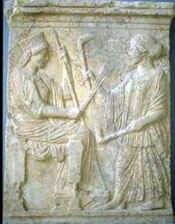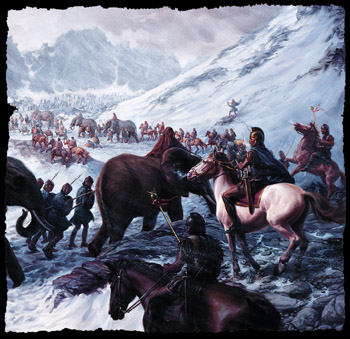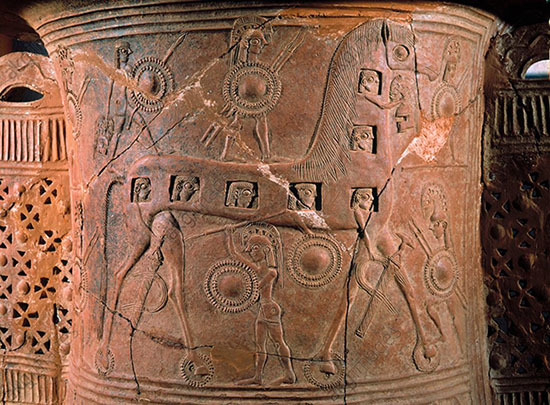Classics Courses 2020-21

Demeter and Persephone, Apollo and Dionysos, Achilles and Agamemnon, Medea and Alcestis. Names of myth and legend, deception and intrigue, true love and not so true love.
Study of the development of the myth, legend, and folklore of the ancient world, especially its place in ancient Greek and Roman culture, and its survival in the modern world.
Sample Syllabus for Classical Mythology
CLA 5-255 Roman History

Hannibal crossing the Alps
This in an introductory course in Roman history that will cover major social, economic, and political developments from the founding of Rome to the reign of Constantine, with an emphasis on Rome’s rise to power beginning with the Punic Wars to the reign of Constantine, who transferred the capital of the empire to Constantinople. Topics to be discussed include the civil wars, the creation of empire, Rome’s place in the ancient Mediterranean world, Roman religion and Christianity. (Humanities) Staff
CLA 7-274 God, Emperors, and Philosophers
Join us for an adventure across Greece and Turkey as we explore cities rich in religious, philosophical, and political history and significance. This course will contextualize the teachings of the apostle Paul among the ruins of Corinth, discuss ancient divination beside the oracle of Delphi, contemplate the brilliant mind of Socrates and his legacy in Athens, and examine how the power of kings and emperors were memorialized across the ancient Mediterranean. We will visit the archaeological sites and modern cities as Athens, Corinth, Delphi, Istanbul, and much more! Additional cost approximately $4000. Cross-listed with REL 268.

The Greeks hiding inside the Trojan horse. Amphora. c. 670 BCE. Mykonos Archaeological Museum.
Think of this course as an introduction to World Mythology. How do different cultures define what it means to be a hero? How does he excel? What qualities does he demonstrate? How does he create a gendered, cultural identity that others admire (or not)? What role do the gods play? And how does each narrative depict the other side? Beginning with Homer's Iliad, we will explore five great epic poems from five different cultures from five different eras: 8th century BCE Greece (The Iliad), 1st century Rome (The Aeneid), 12th century France (The Song of Roland), 20th century West Africa (Sunjata), and the late 20th century Caribbean (Derek Walcott’s Omeros). This course is a great way to become familiar with world mythology, oral poetry, and five stirring narratives. Taught in English. Prerequisite: Writing-designated course (W). (Humanities) Staff
